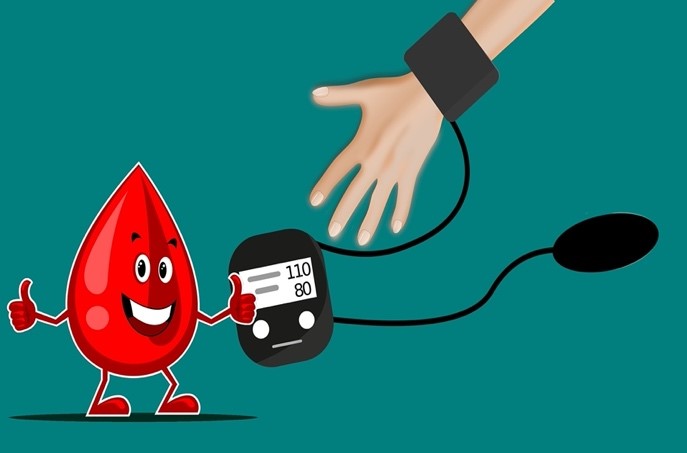Cormick G, Ciapponi A, Cafferata ML, Cormick MS, Belizán JM. Calcium supplementation for prevention of primary hypertension. Cochrane Database of Systematic Reviews 2021, Issue 8. Art. No.: CD010037. DOI: 10.1002/14651858.CD010037.pub3.
Picture this…
John is a physically active and healthy individual in his early 30s but comes from a family with a history of high blood pressure (hypertension) and cardiovascular diseases. Even though he does not have high blood pressure, John believes that his family history means that he may get high blood pressure in the future. John always follows additional preventive measures and precautions against high blood pressure. John has recently heard on the news about a new treatment for preventing high blood pressure and wants to know more about the treatment and whether it works.

IMAGE 1: Image depicting a cartoon of a male doctor holding an image of a heart and stethoscope.
Image by mohamed_hassan on Pixabay
Summary messages:
- An increase in calcium intake slightly reduces blood pressure in people with normal blood pressure.
- Adults younger than 35 years exhibited a greater reduction in blood pressure compared to adults older than 35 years.
- Even small reductions in blood pressure could have important implications for improving cardiovascular health.
- None of the studies reported adverse effects from the treatment.
- More research is needed to confirm the optimal strategy of calcium intake interventions with more focus on older adults.
What the research says:
High blood pressure (hypertension) is a common condition that affects many individuals and leads to cardiovascular diseases. When someone has high blood pressure the force of the blood pushing on the blood vessel walls is too high, this means that their heart has to pump harder and the blood vessels that carry blood away from the heart (arteries) are under greater strain. A blood pressure reading consists of two numbers. The first number (systolic blood pressure) is a measure of the force that occurs as blood pumps out of the heart and into the arteries. The second number (diastolic blood pressure) is a measure of the force that is created as the heart rests between beats. Hypertension is diagnosed when systolic blood pressure is between 130 and 139mmHg and diastolic blood pressure is between 80 and 89mmHg. After a while, high blood pressure can damage the heart, brain, kidneys and eyes.
In this systematic review published by the Cochrane Library, the authors wanted to assess whether increasing calcium intake to reduce blood pressure as means to prevent hypertension was safe and effective.

IMAGE 2: Photograph of various tablet packets and tablets, depicting medication.
Image by Nataliya Vaitkevich on Pexels
The review authors collected data from 18 published, unpublished, and ongoing randomised studies where people of all ages were given either calcium supplements or an inactive treatment (placebo). The calcium supplements consisted of pills, powder, food, or beverage fortification. The people in the studies had normal blood pressure. The total number of people in the 18 studies was 3140.
The main results of the research indicate a reduction in the blood pressure in the experimental groups consuming calcium compared to the control/placebo groups. The effect was higher with doses of calcium above 1000mg/day. Systolic blood pressure was reduced by 1.05mmHg with doses of 1000 to 1500mg/day and by 2.79mmHg with doses of calcium equal to or greater than 1500mg/day. The reduction in blood pressure was seen 3.5 months after starting the treatment. Younger adults showed a higher reduction in blood pressure compared to older adults. However, there is some suggestion that the effect may be reduced over time in people with an adequate intake of calcium; more studies are required to look at this in more detail.
The review authors suggest that more research is needed to work out who could benefit the most from this treatment, optimal doses, side effects and whether it is best to increase calcium intake through diet or by taking supplements.
Where is John now…
John has discussed the research with his physician. They have decided that there are too many questions about the best and safest way to increase his calcium consumption to take any action yet. However, John has been looking at his diet and finding ways to sneak more curly kale and sardines into his meals.

IMAGE 3: Image depicting a cartoon drop of blood next to a blood pressure monitor attached to a patient.
Image by mohamed_hassan on Pixabay
Abdulah Al Ameer
3rd-year Honours BSc in Biomedical Science, University of Ottawa;
Student Research Assistant, Bruyère Research Institute.
Please note that the stories and pictures used do not represent a specific individual – they are merely utilised to contextualise the data into a digestible format. Moreover, this research is applicable to both male and female adults aged 18 and above.
Reference point:
Cormick G, Ciapponi A, Cafferata ML, Cormick MS, Belizán JM. Calcium supplementation for prevention of primary hypertension. Cochrane Database of Systematic Reviews 2021, Issue 8. Art. No.: CD010037. DOI: 10.1002/14651858.CD010037.pub3.
If you have any comments regarding this blog post, please contact us at globalageing@cochrane.org. We would love to hear your thoughts and answer any questions you may have.
Web editor: Monserrat Conde
